Answered step by step
Verified Expert Solution
Question
1 Approved Answer
Case 15 Please be as elaborate as possible, this is a Strategic Management university paper. Keeping in mind the last paragraphs before the references. You
Case 15
Please be as elaborate as possible, this is a Strategic Management university paper.
Keeping in mind the last paragraphs before the references. You are an advisor to the company, give a complete analysis of the case. Identify the problems and give solutions. Give a complete SWOT and PESTEL analysis of the Case study (SWOT and PESTEL).
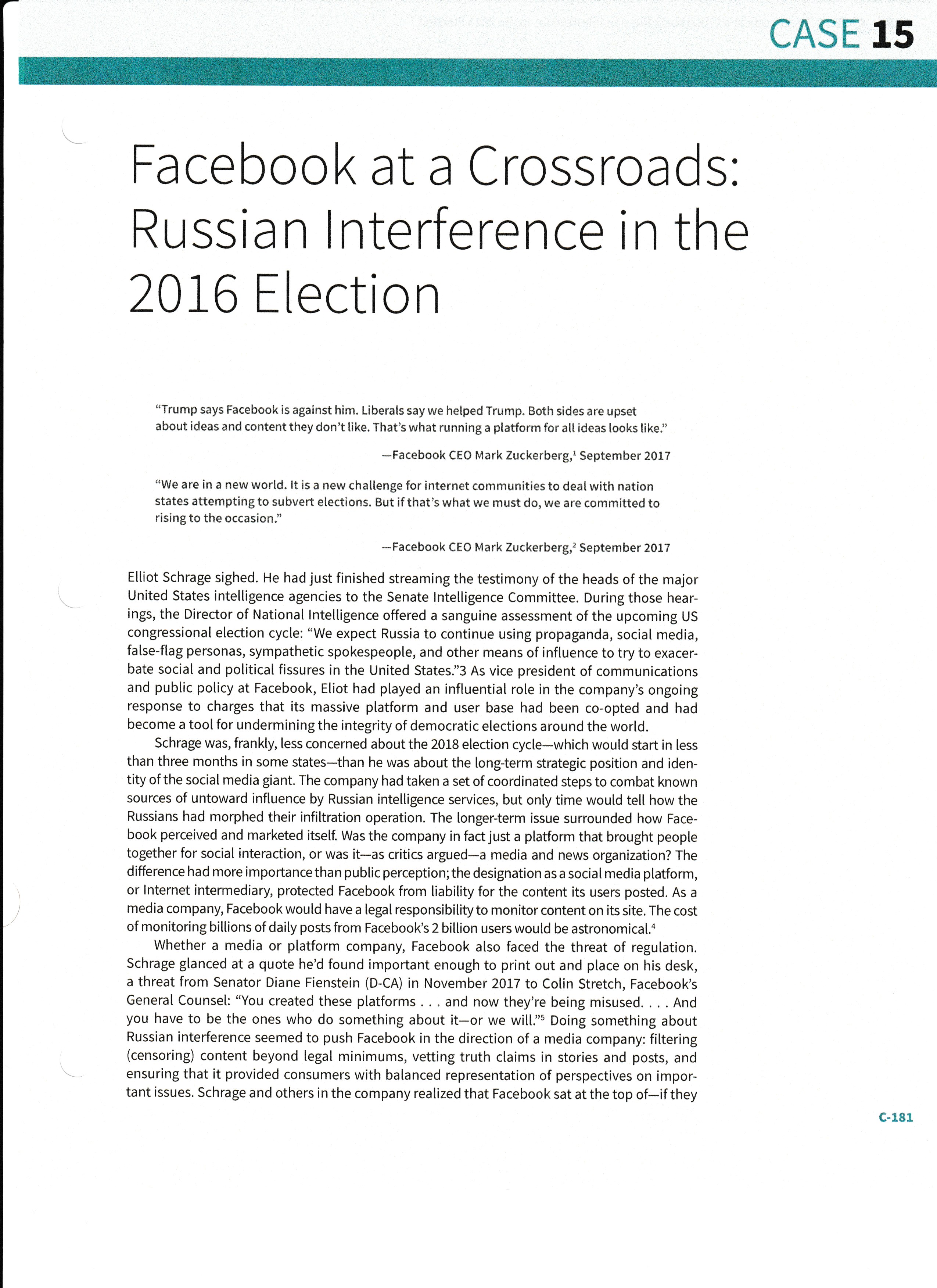
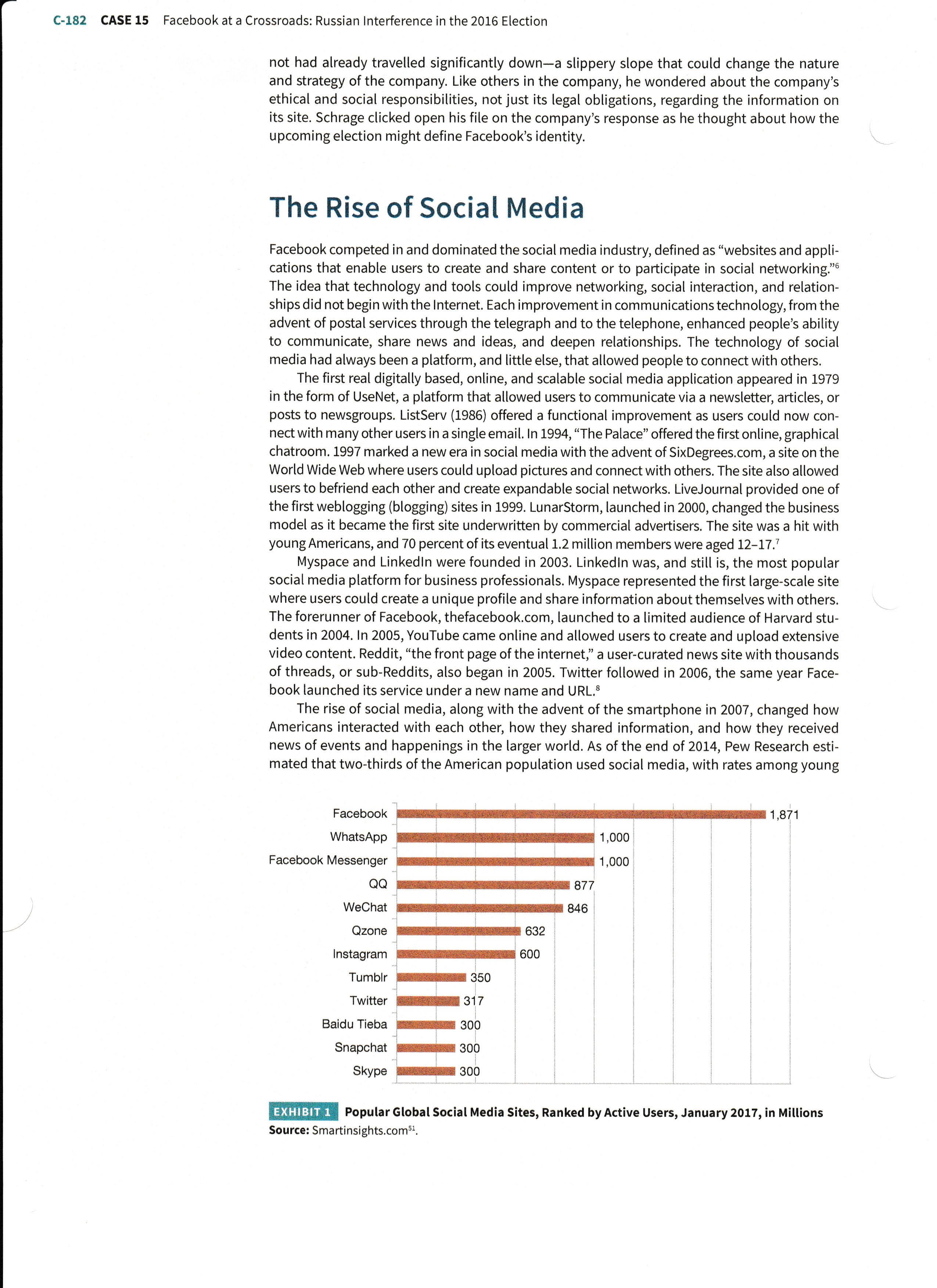
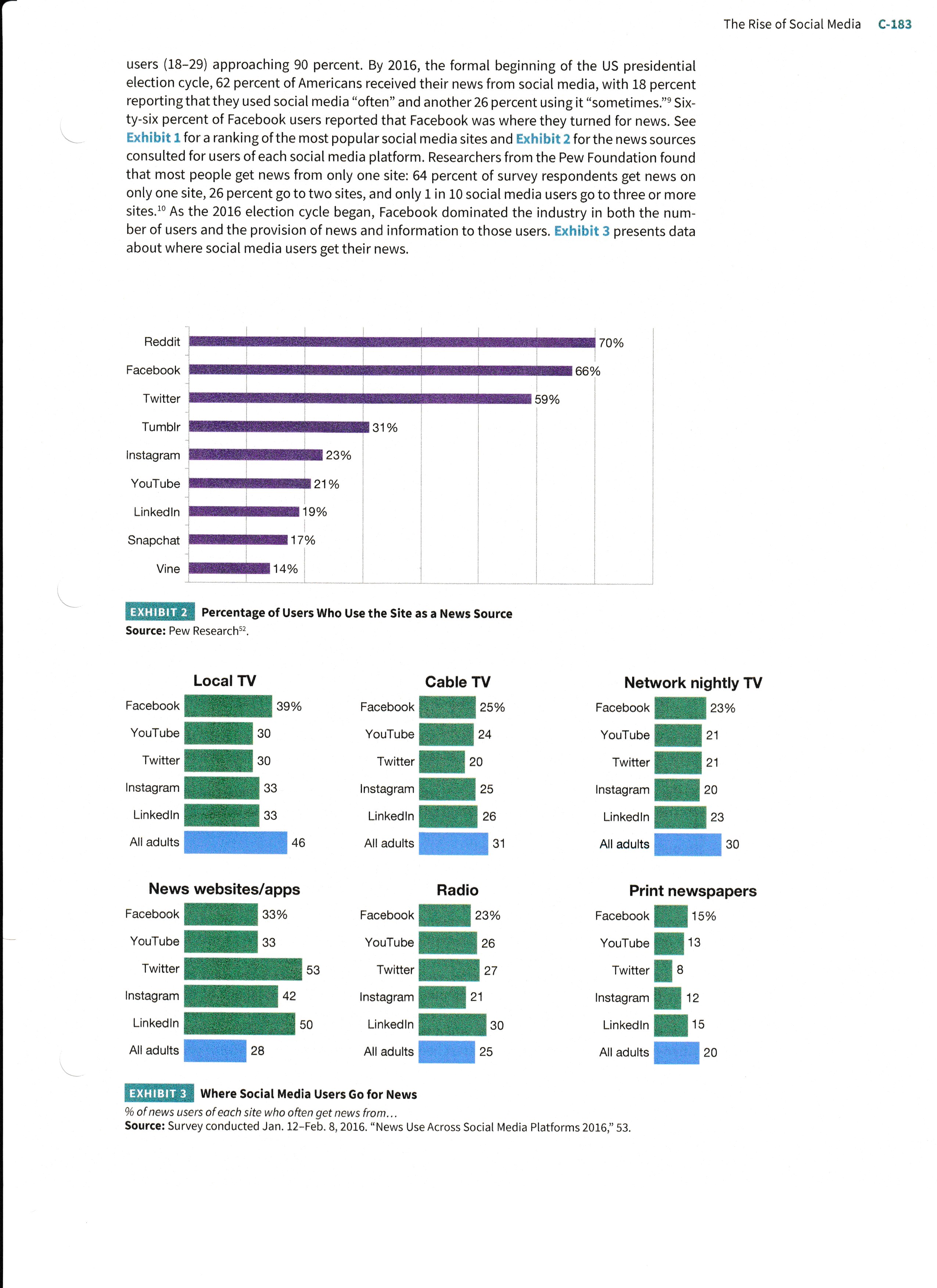
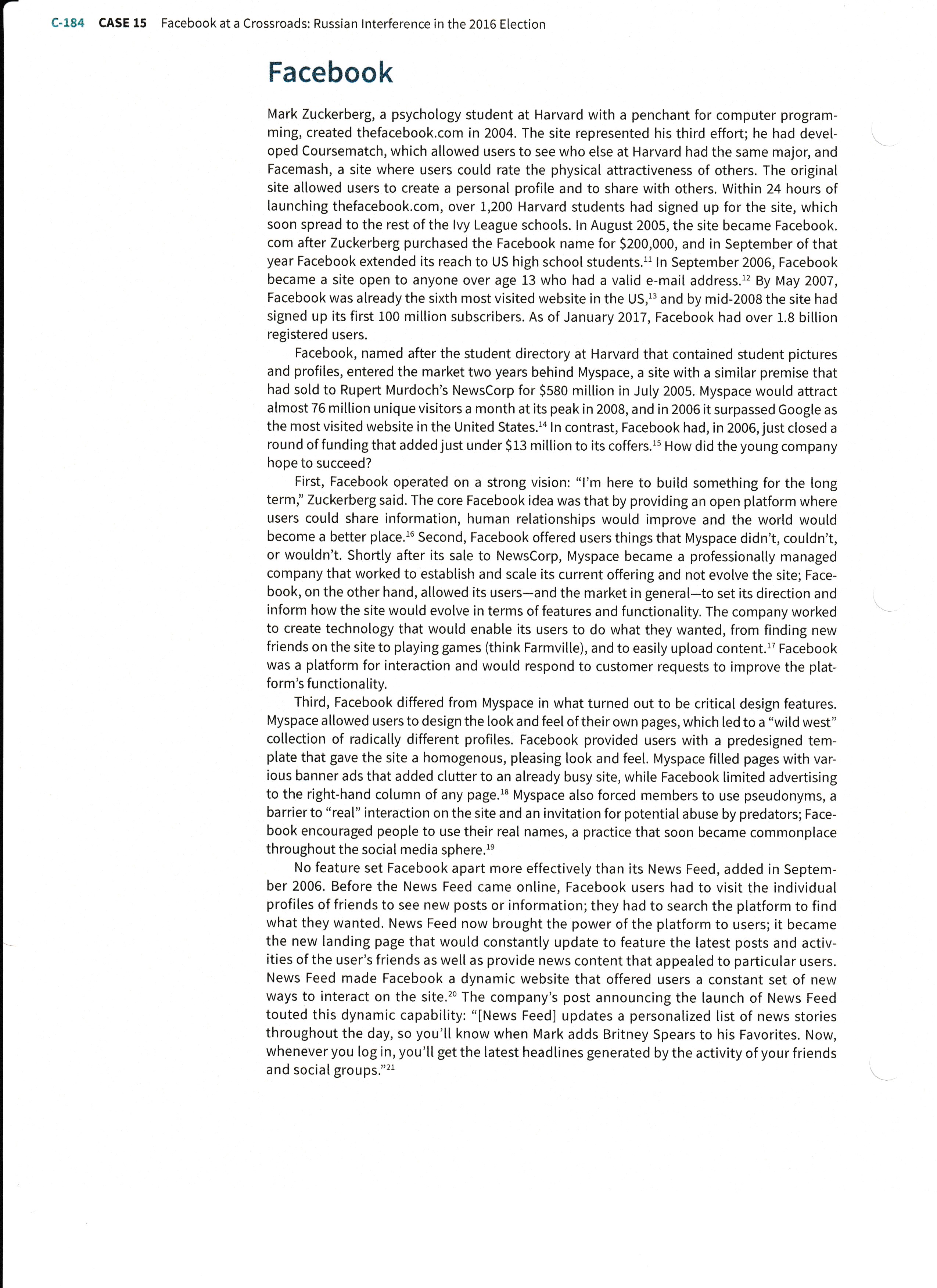
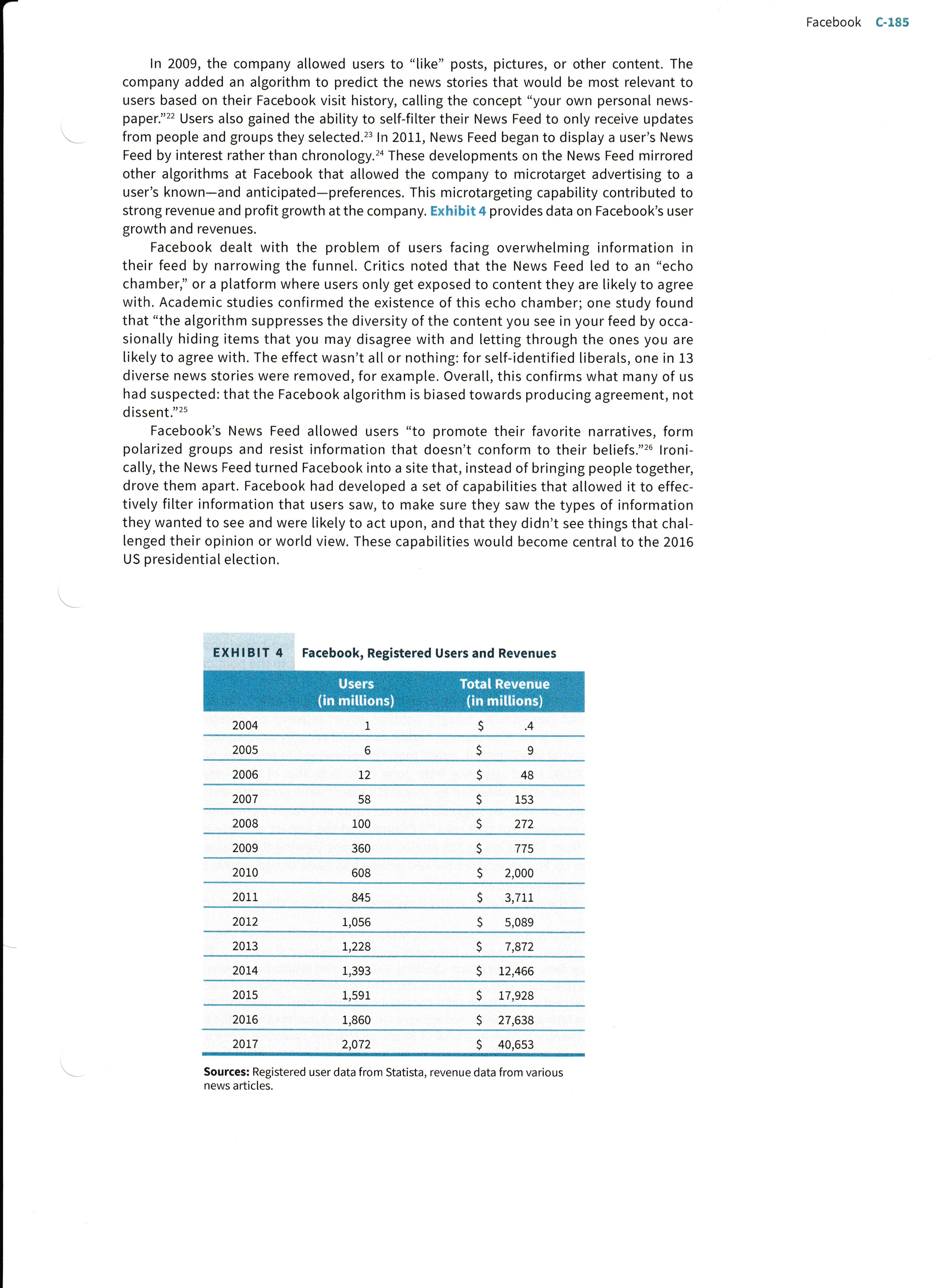
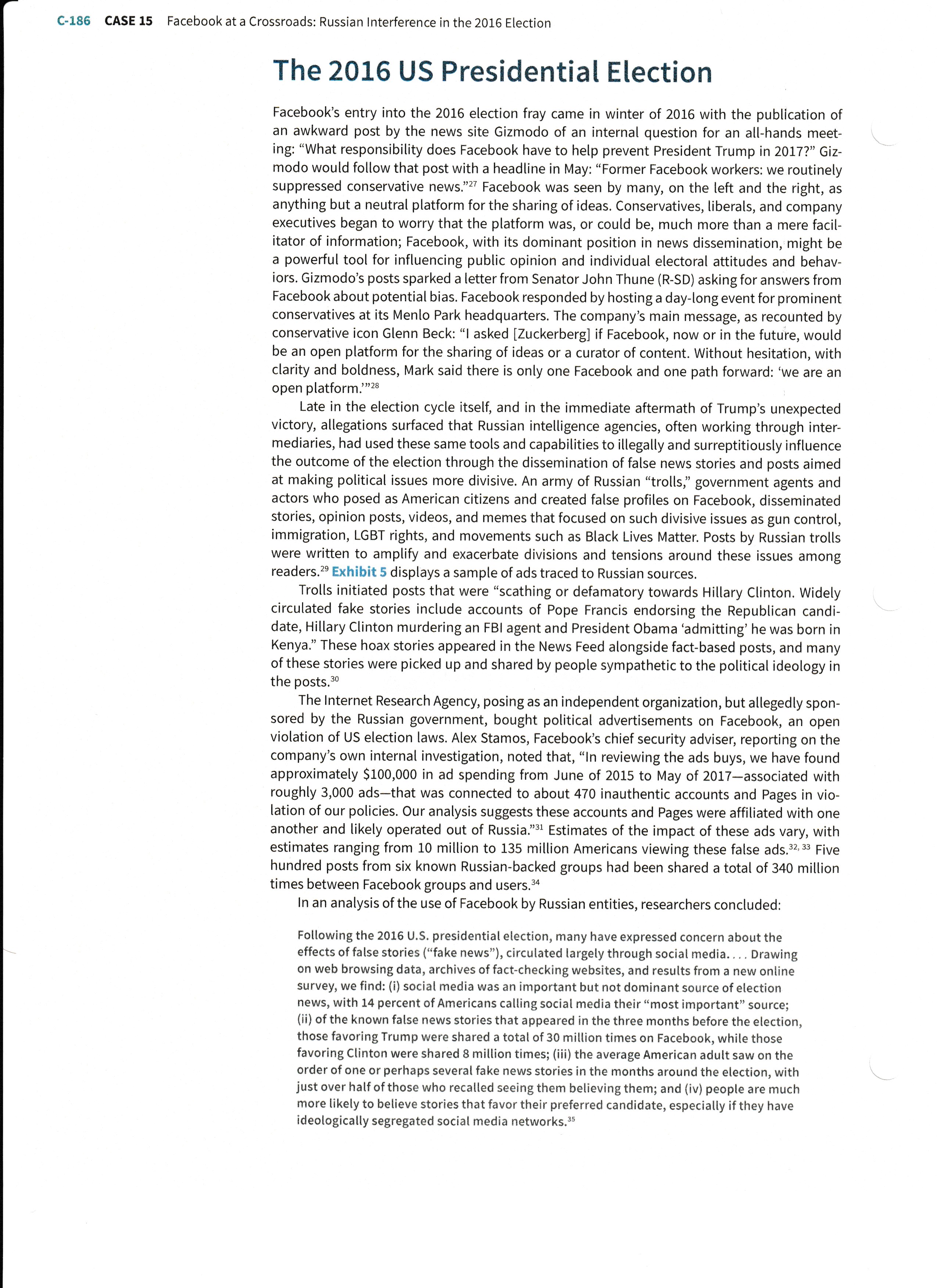
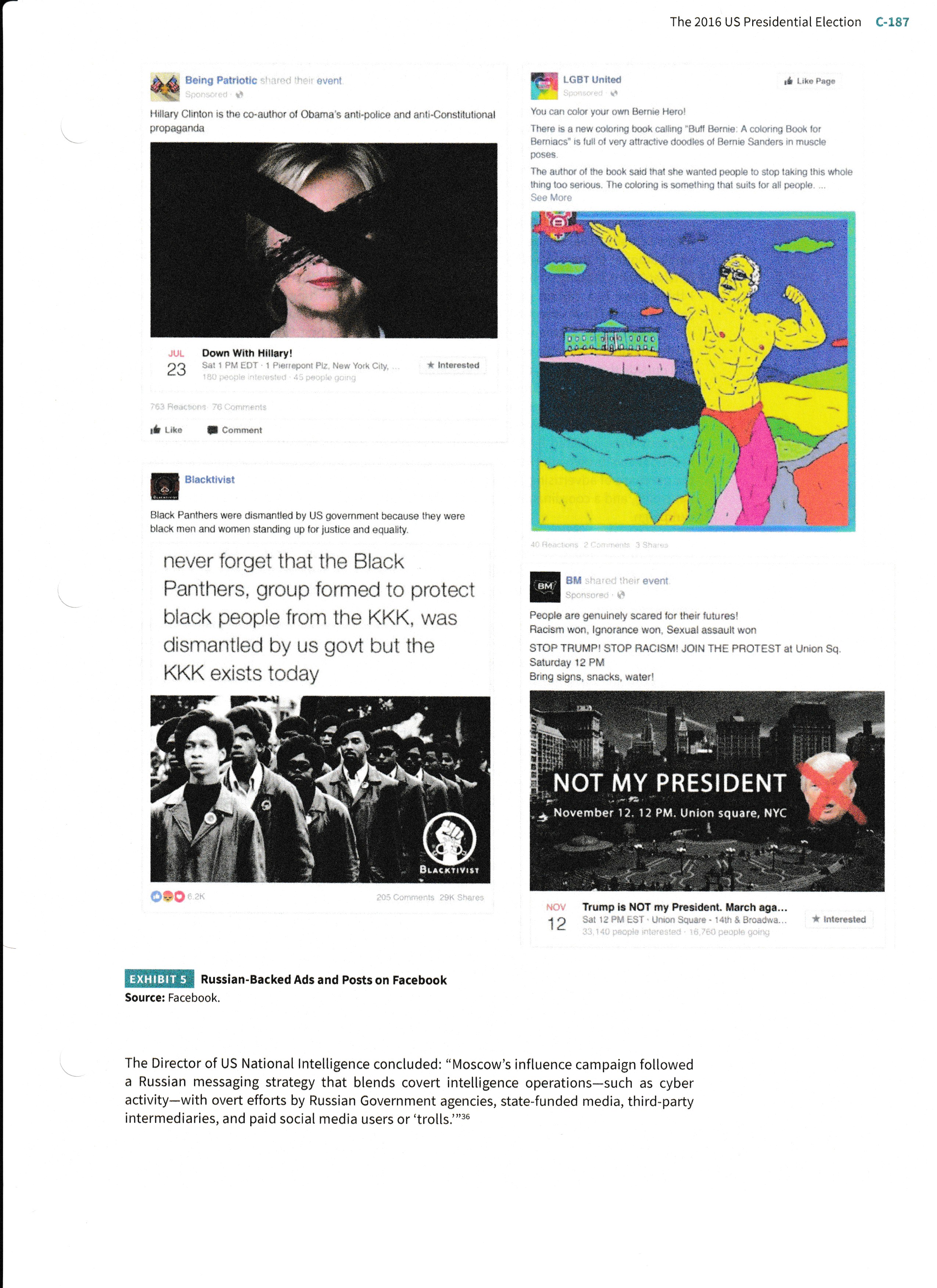
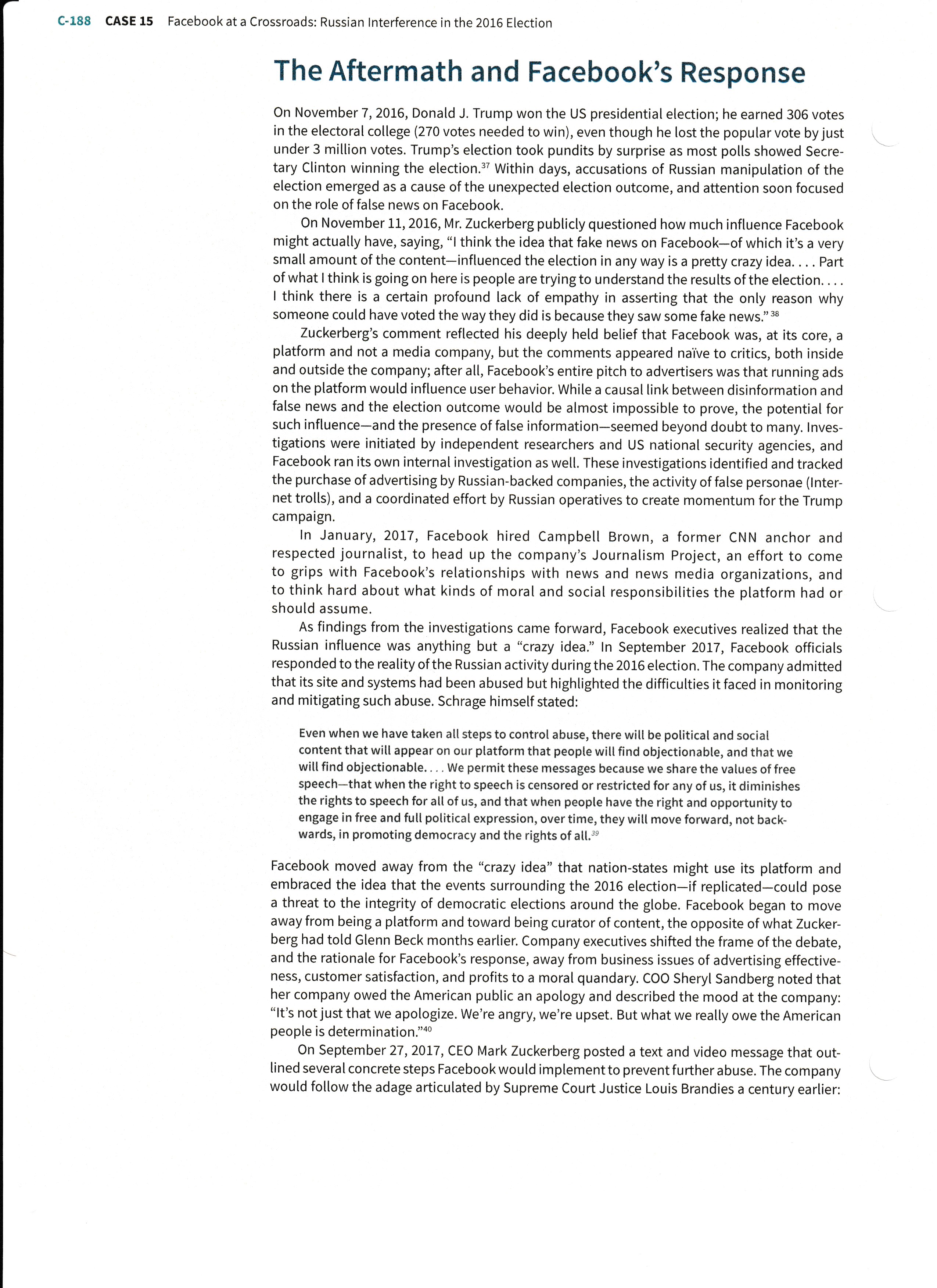
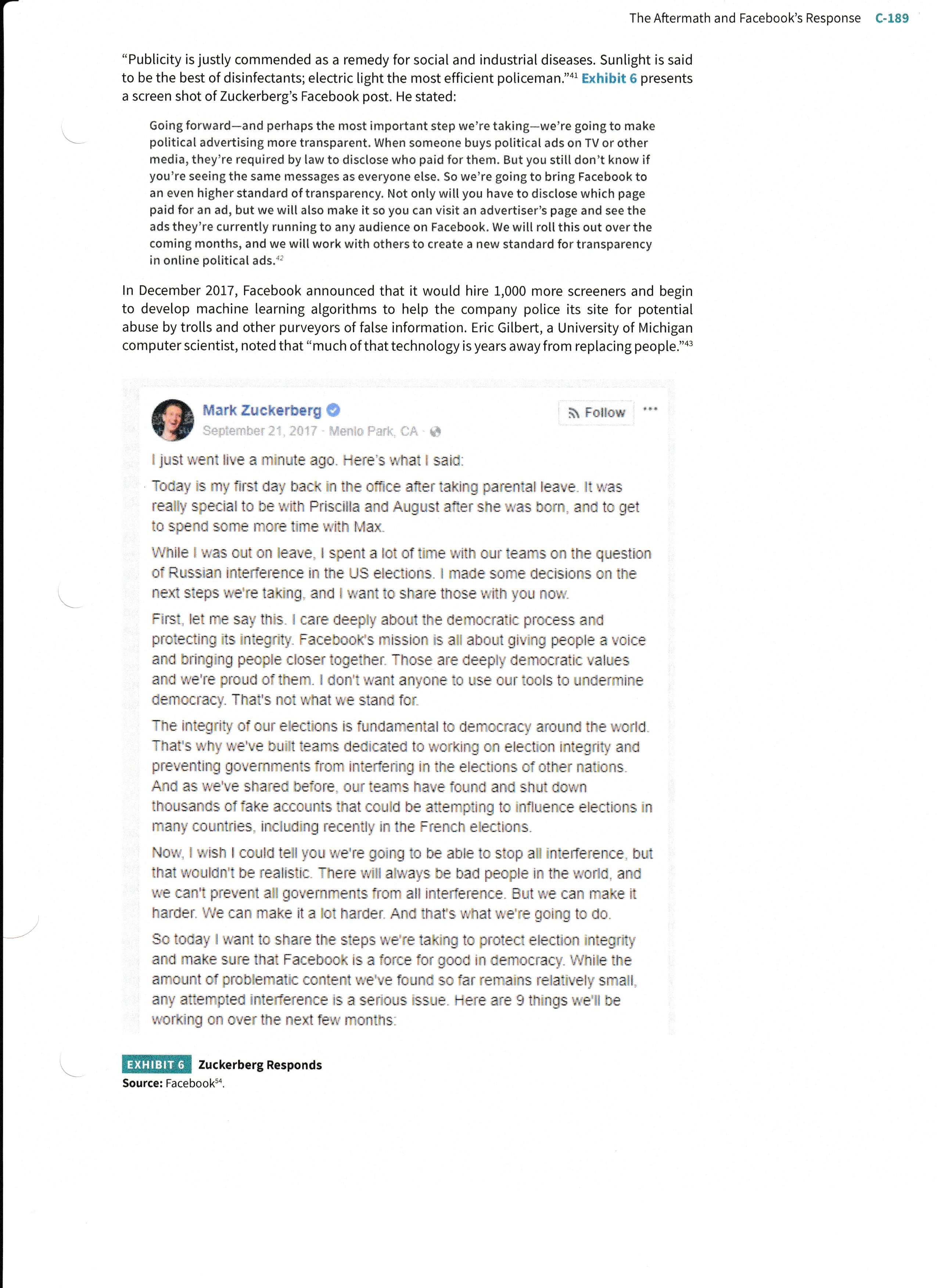
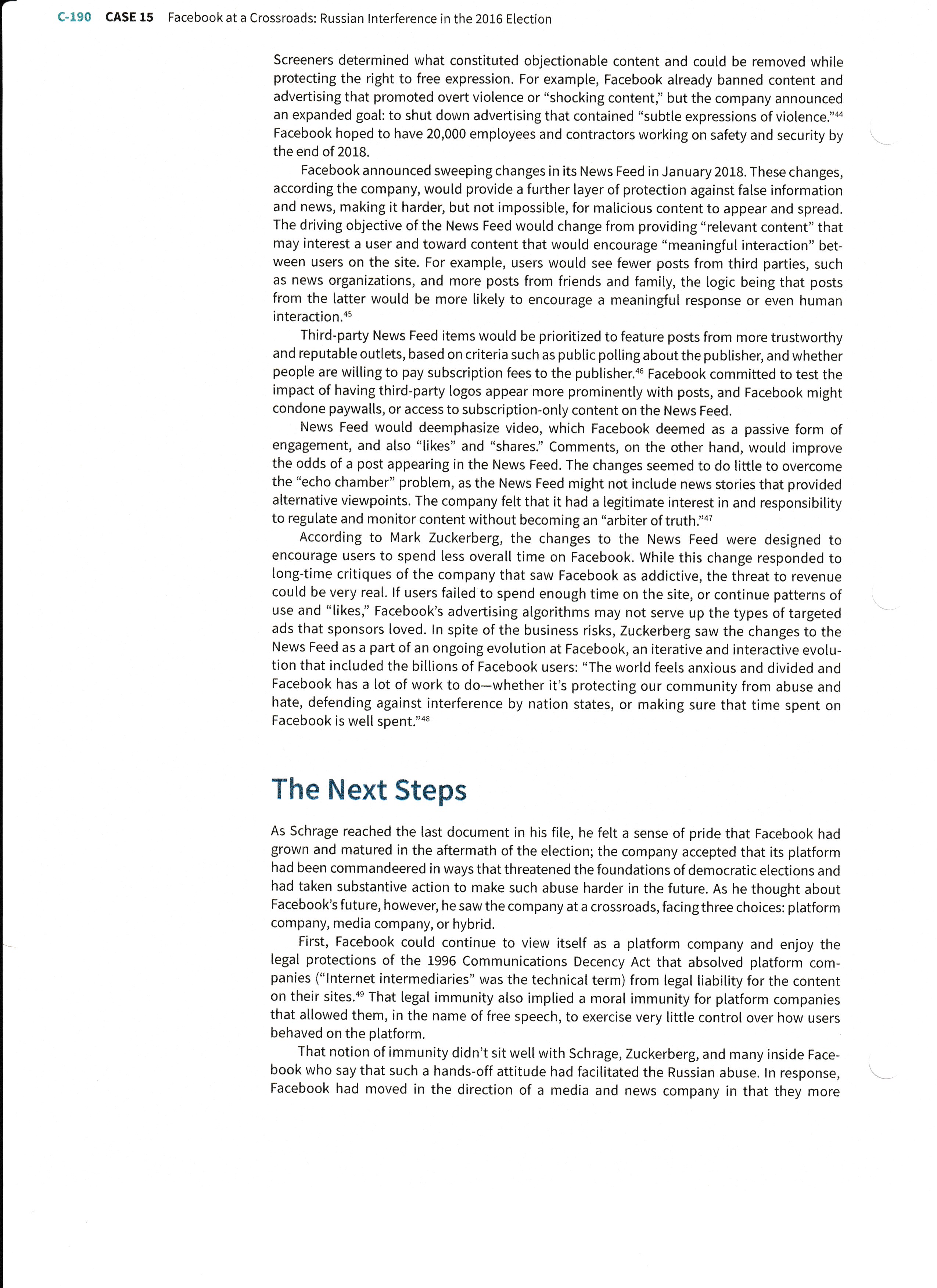
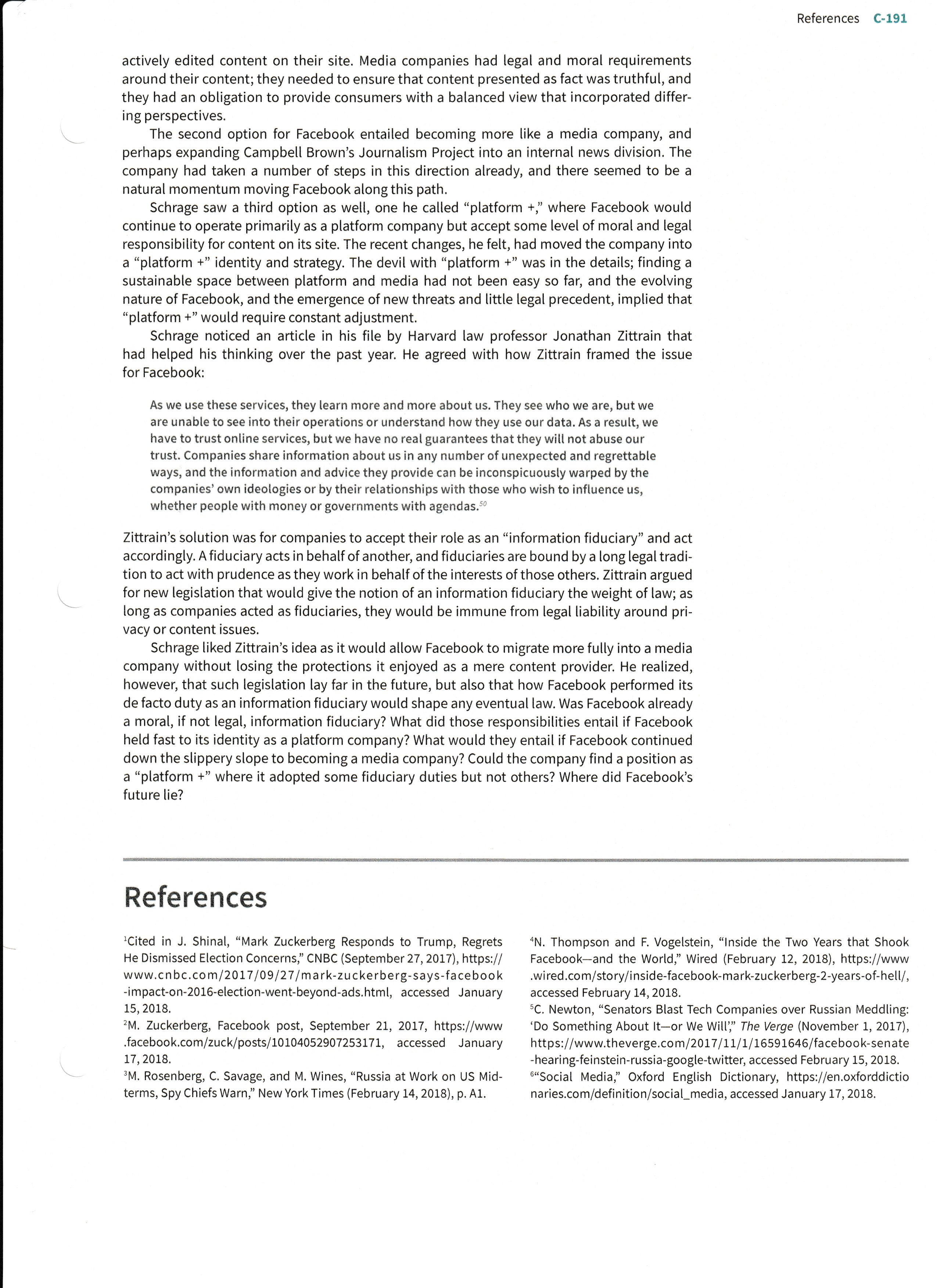
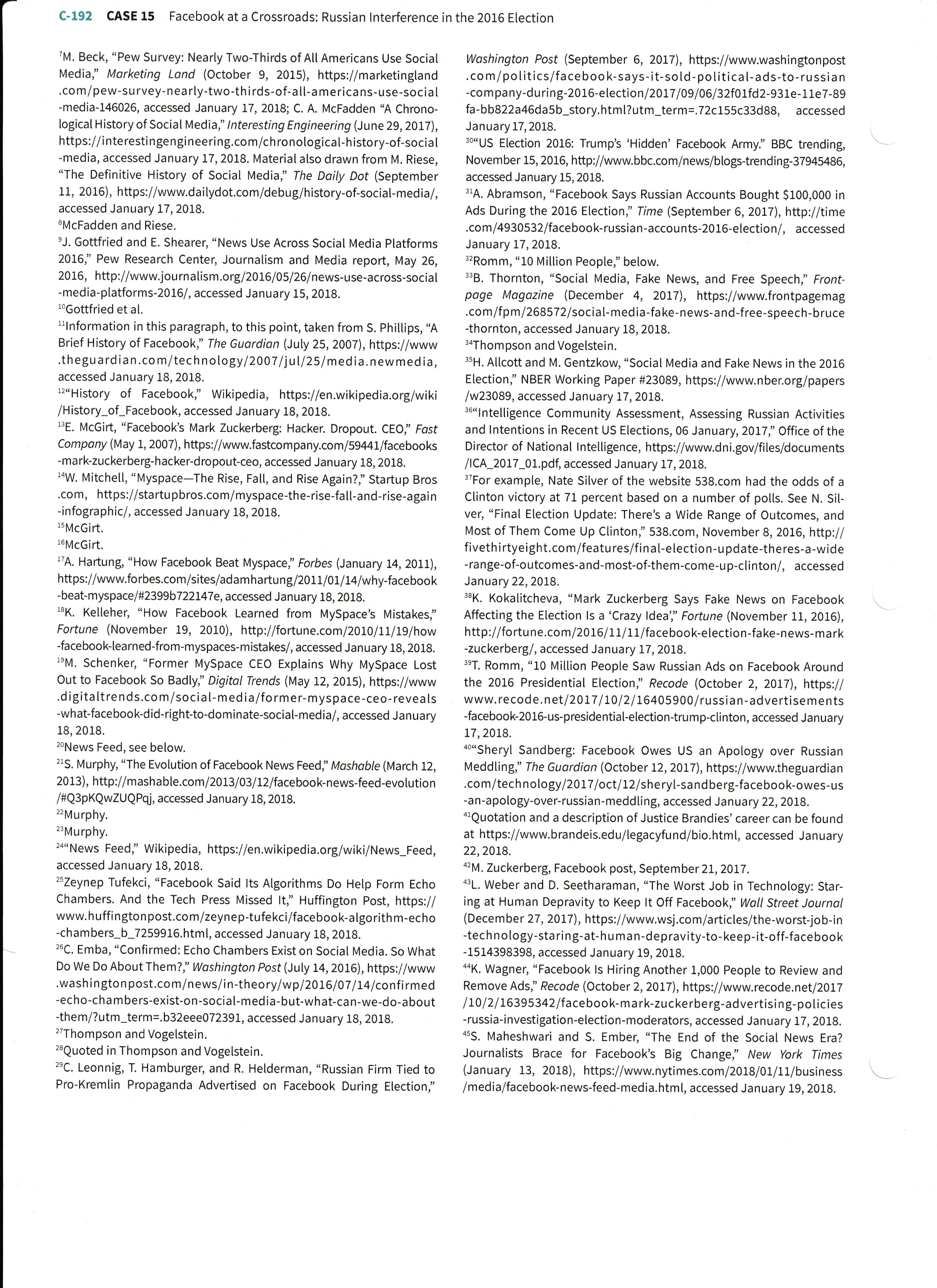
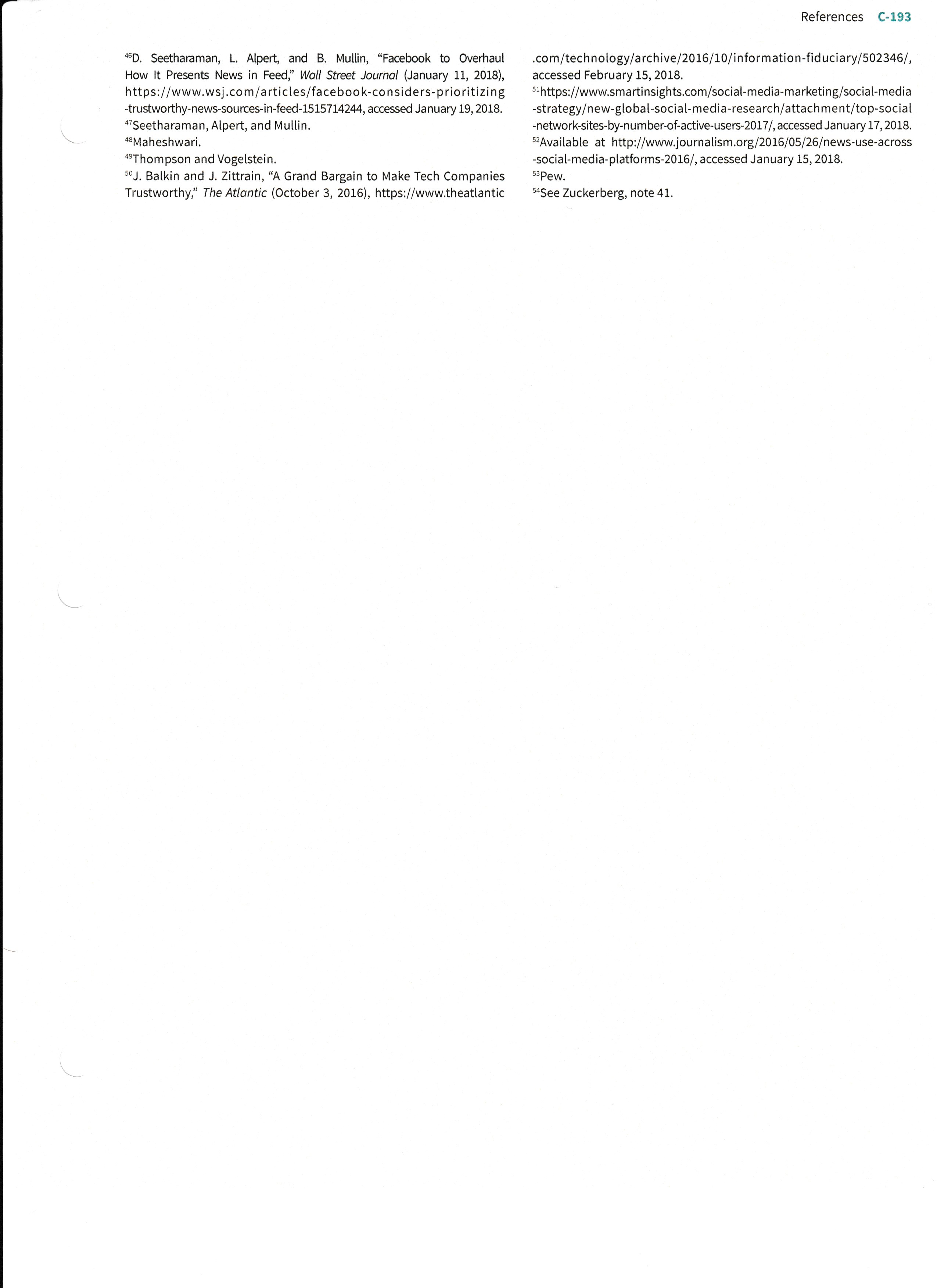
Facebook at a crossroads: Russian Interference in the 2016ElectiOn "Trump says Facebook is against him. Liberals say we helped Trump. Both sides are upset about ideas and content they don't like. That's what running a platform for all ideas looks like." -Facebook CEO Mark Zuckerberg, 11 September 2017 "We are in a new world. It is a new challenge for internet communities to deal with nation states attempting to subvert elections. But if that's what we must do, we are committed to rising to the occasion." -Facebook CEO Mark Zuckerberg, 2 September 2017 Elliot Schrage sighed. He had just finished streaming the testimony of the heads of the major United States intelligence agencies to the Senate Intelligence Committee. During those hearings, the Director of National Intelligence offered a sanguine assessment of the upcoming US congressional election cycle: "We expect Russia to continue using propaganda, social media, false-flag personas, sympathetic spokespeople, and other means of influence to try to exacerbate social and political fissures in the United States."3 As vice president of communications and public policy at Facebook, Eliot had played an influential role in the company's ongoing response to charges that its massive platform and user base had been co-opted and had become a tool for undermining the integrity of democratic elections around the world. Schrage was, frankly, less concerned about the 2018 election cycle-which would start in less than three months in some states-than he was about the long-term strategic position and identity of the social media giant. The company had taken a set of coordinated steps to combat known sources of untoward influence by Russian intelligence services, but only time would tell how the Russians had morphed their infiltration operation. The longer-term issue surrounded how Facebook perceived and marketed itself. Was the company in fact just a platform that brought people together for social interaction, or was it-as critics argued-a media and news organization? The difference had more importance than public perception; the designation as a social media platform, or Internet intermediary, protected Facebook from liability for the content its users posted. As a media company, Facebook would have a legal responsibility to monitor content on its site. The cost of monitoring billions of daily posts from Facebook's 2 billion users would be astronomical. 4 Whether a media or platform company, Facebook also faced the threat of regulation. Schrage glanced at a quote he'd found important enough to print out and place on his desk, a threat from Senator Diane Fienstein (D-CA) in November 2017 to Colin Stretch, Facebook's General Counsel: "You created these platforms . . . and now they're being misused. . . And you have to be the ones who do something about it-or we will."5 Doing something about Russian interference seemed to push Facebook in the direction of a media company: filtering (censoring) content beyond legal minimums, vetting truth claims in stories and posts, and ensuring that it provided consumers with balanced representation of perspectives on important issues. Schrage and others in the company realized that Facebook sat at the top of-if they not had already travelled significantly down-a slippery slope that could change the nature and strategy of the company. Like others in the company, he wondered about the company's ethical and social responsibilities, not just its legal obligations, regarding the information on its site. Schrage clicked open his file on the company's response as he thought about how the upcoming election might define Facebook's identity. The Rise of Social Media Facebook competed in and dominated the social media industry, defined as "websites and applications that enable users to create and share content or to participate in social networking." The idea that technology and tools could improve networking, social interaction, and relationships did not begin with the Internet. Each improvement in communications technology, from the advent of postal services through the telegraph and to the telephone, enhanced people's ability to communicate, share news and ideas, and deepen relationships. The technology of social media had always been a platform, and little else, that allowed people to connect with others. The first real digitally based, online, and scalable social media application appeared in 1979 in the form of UseNet, a platform that allowed users to communicate via a newsletter, articles, or posts to newsgroups. ListServ (1986) offered a functional improvement as users could now connect with many other users in a single email. In 1994, "The Palace" offered the first online, graphical chatroom. 1997 marked a new era in social media with the advent of SixDegrees.com, a site on the World Wide Web where users could upload pictures and connect with others. The site also allowed users to befriend each other and create expandable social networks. Live Journal provided one of the first weblogging (blogging) sites in 1999. LunarStorm, launched in 2000, changed the business model as it became the first site underwritten by commercial advertisers. The site was a hit with young Americans, and 70 percent of its eventual 1.2 million members were aged 1217.7 Myspace and Linkedln were founded in 2003. Linkedln was, and still is, the most popular social media platform for business professionals. Myspace represented the first large-scale site where users could create a unique profile and share information about themselves with others. The forerunner of Facebook, thefacebook.com, launched to a limited audience of Harvard students in 2004. In 2005, YouTube came online and allowed users to create and upload extensive video content. Reddit, "the front page of the internet," a user-curated news site with thousands of threads, or sub-Reddits, also began in 2005. Twitter followed in 2006, the same year Facebook launched its service under a new name and URL. 8 The rise of social media, along with the advent of the smartphone in 2007, changed how Americans interacted with each other, how they shared information, and how they received news of events and happenings in the larger world. As of the end of 2014, Pew Research estimated that two-thirds of the American population used social media, with rates among young EXHIBIT 1 Popular Global Social Media Sites, Ranked by Active Users, January 2017, in Millions Source: Smartinsights.com 51. users (18-29) approaching 90 percent. By 2016, the formal beginning of the US presidential election cycle, 62 percent of Americans received their news from social media, with 18 percent reporting that they used social media "often" and another 26 percent using it "sometimes." Sixty-six percent of Facebook users reported that Facebook was where they turned for news. See Exhibit 1 for a ranking of the most popular social media sites and Exhibit 2 for the news sources consulted for users of each social media platform. Researchers from the Pew Foundation found that most people get news from only one site: 64 percent of survey respondents get news on only one site, 26 percent go to two sites, and only 1 in 10 social media users go to three or more sites. 10 As the 2016 election cycle began, Facebook dominated the industry in both the number of users and the provision of news and information to those users. Exhibit 3 presents data about where social media users get their news. EXHIBIT 2 Percentage of Users Who Use the Site as a News Source Source: Pew Research 52. EXHIBIT 3 Where Social Media Users Go for News % of news users of each site who often get news from... Source: Survey conducted Jan. 12-Feb. 8, 2016. "News Use Across Social Media Platforms 2016," 53. Mark Zuckerberg, a psychology student at Harvard with a penchant for computer programming, created thefacebook.com in 2004. The site represented his third effort; he had developed Coursematch, which allowed users to see who else at Harvard had the same major, and Facemash, a site where users could rate the physical attractiveness of others. The original site allowed users to create a personal profile and to share with others. Within 24 hours of launching thefacebook.com, over 1,200 Harvard students had signed up for the site, which soon spread to the rest of the Ivy League schools. In August 2005, the site became Facebook. com after Zuckerberg purchased the Facebook name for $200,000, and in September of that year Facebook extended its reach to US high school students. 11 In September 2006, Facebook became a site open to anyone over age 13 who had a valid e-mail address. 12 By May 2007, Facebook was already the sixth most visited website in the US, 13 and by mid-2008 the site had signed up its first 100 million subscribers. As of January 2017, Facebook had over 1.8 billion registered users. Facebook, named after the student directory at Harvard that contained student pictures and profiles, entered the market two years behind Myspace, a site with a similar premise that had sold to Rupert Murdoch's NewsCorp for $580 million in July 2005. Myspace would attract almost 76 million unique visitors a month at its peak in 2008, and in 2006 it surpassed Google as the most visited website in the United States. 14 In contrast, Facebook had, in 2006, just closed a round of funding that added just under $13 million to its coffers. 15 How did the young company hope to succeed? First, Facebook operated on a strong vision: "I'm here to build something for the long term," Zuckerberg said. The core Facebook idea was that by providing an open platform where users could share information, human relationships would improve and the world would become a better place. 16 Second, Facebook offered users things that Myspace didn't, couldn't, or wouldn't. Shortly after its sale to NewsCorp, Myspace became a professionally managed company that worked to establish and scale its current offering and not evolve the site; Facebook, on the other hand, allowed its users-and the market in general-to set its direction and inform how the site would evolve in terms of features and functionality. The company worked to create technology that would enable its users to do what they wanted, from finding new friends on the site to playing games (think Farmville), and to easily upload content. 17 Facebook was a platform for interaction and would respond to customer requests to improve the platform's functionality. Third, Facebook differed from Myspace in what turned out to be critical design features. Myspace allowed users to design the look and feel of their own pages, which led to a "wild west" collection of radically different profiles. Facebook provided users with a predesigned template that gave the site a homogenous, pleasing look and feel. Myspace filled pages with various banner ads that added clutter to an already busy site, while Facebook limited advertising to the right-hand column of any page. 18 Myspace also forced members to use pseudonyms, a barrier to "real" interaction on the site and an invitation for potential abuse by predators; Facebook encouraged people to use their real names, a practice that soon became commonplace throughout the social media spere. 19 No feature set Facebook apart more effectively than its News Feed, added in September 2006. Before the News Feed came online, Facebook users had to visit the individual profiles of friends to see new posts or information; they had to search the platform to find what they wanted. News Feed now brought the power of the platform to users; it became the new landing page that would constantly update to feature the latest posts and activities of the user's friends as well as provide news content that appealed to particular users. News Feed made Facebook a dynamic website that offered users a constant set of new ways to interact on the site. 20 The company's post announcing the launch of News Feed touted this dynamic capability: "[News Feed] updates a personalized list of news stories throughout the day, so you'll know when Mark adds Britney Spears to his Favorites. Now, whenever you log in, you'll get the latest headlines generated by the activity of your friends and social groups."21 In 2009 , the company allowed users to "like" posts, pictures, or other content. The company added an algorithm to predict the news stories that would be most relevant to users based on their Facebook visit history, calling the concept "your own personal newspaper."22 Users also gained the ability to self-filter their News Feed to only receive updates from people and groups they selected. 23 In 2011, News Feed began to display a user's News Feed by interest rather than chronology. 24 These developments on the News Feed mirrored other algorithms at Facebook that allowed the company to microtarget advertising to a user's known-and anticipated-preferences. This microtargeting capability contributed to strong revenue and profit growth at the company. Exhibit 4 provides data on Facebook's user growth and revenues. Facebook dealt with the problem of users facing overwhelming information in their feed by narrowing the funnel. Critics noted that the News Feed led to an "echo chamber," or a platform where users only get exposed to content they are likely to agree with. Academic studies confirmed the existence of this echo chamber; one study found that "the algorithm suppresses the diversity of the content you see in your feed by occasionally hiding items that you may disagree with and letting through the ones you are likely to agree with. The effect wasn't all or nothing: for self-identified liberals, one in 13 diverse news stories were removed, for example. Overall, this confirms what many of us had suspected: that the Facebook algorithm is biased towards producing agreement, not dissent." 25 Facebook's News Feed allowed users "to promote their favorite narratives, form polarized groups and resist information that doesn't conform to their beliefs." 26 Ironically, the News Feed turned Facebook into a site that, instead of bringing people together, drove them apart. Facebook had developed a set of capabilities that allowed it to effectively filter information that users saw, to make sure they saw the types of information they wanted to see and were likely to act upon, and that they didn't see things that challenged their opinion or world view. These capabilities would become central to the 2016 US presidential election. EXHIBIT 4 Facebook, Registered Users and Revenues Sources: Registered user data from Statista, revenue data from various news articles. Hillary Clinton is the co-author of Obama's anti-police and anti-Constitutional propaganda You can color your own Bernie Herol There is a new coloring book calling "Bull Bernie: A coloring Book for Bemiacs" is full of very attractive doodles of Bemie Sanders in muscle poses. The author of the book said that she wanted people to stop taking this whole thing too serious. The coloring is something that suits lor all people.. See More JUL Down With Hillary! 23 Sat I PM EDT - 1 Pierrepont Plz, New York Cily, tBo peoble interestsu 44 people going * Interested 763 meacrons re comments Like Comment Blacktivist Black Panthers were dismantled by US government because they were black men and women standing up for justice and equality. never forget that the Black Panthers, group formed to protect black people from the KKK, was dismantled by us govt but the KKK exists today BM BM shated thei event Sponsured 4 People are genuinely scared for their futures! Racism won, Ignorance won, Sexual assault won STOP TRUMPI STOP RACISMI JOIN THEPROTEST at Union Sq. Saturday 12PM Bring signs, snacks, water! EXHIBIT 5 Russian-Backed Ads and Posts on Facebook Source: Facebook. The Director of US National Intelligence concluded: "Moscow's influence campaign followed a Russian messaging strategy that blends covert intelligence operations-such as cyber activity-with overt efforts by Russian Government agencies, state-funded media, third-party intermediaries, and paid social media users or 'trolls.'" 36 On November 7, 2016, Donald J. Trump won the US presidential election; he earned 306 votes in the electoral college ( 270 votes needed to win), even though he lost the popular vote by just under 3 million votes. Trump's election took pundits by surprise as most polls showed Secretary Clinton winning the election.. 37 Within days, accusations of Russian manipulation of the election emerged as a cause of the unexpected election outcome, and attention soon focused on the role of false news on Facebook. On November 11, 2016, Mr. Zuckerberg publicly questioned how much influence Facebook might actually have, saying, "I think the idea that fake news on Facebook-of which it's a very small amount of the content-influenced the election in any way is a pretty crazy idea. ... Part of what I think is going on here is people are trying to understand the results of the election.... I think there is a certain profound lack of empathy in asserting that the only reason why someone could have voted the way they did is because they saw some fake news." 38 Zuckerberg's comment reflected his deeply held belief that Facebook was, at its core, a platform and not a media company, but the comments appeared nave to critics, both inside and outside the company; after all, Facebook's entire pitch to advertisers was that running ads on the platform would influence user behavior. While a causal link between disinformation and false news and the election outcome would be almost impossible to prove, the potential for such influence-and the presence of false information-seemed beyond doubt to many. Investigations were initiated by independent researchers and US national security agencies, and Facebook ran its own internal investigation as well. These investigations identified and tracked the purchase of advertising by Russian-backed companies, the activity of false personae (Internet trolls), and a coordinated effort by Russian operatives to create momentum for the Trump campaign. In January, 2017, Facebook hired Campbell Brown, a former CNN anchor and respected journalist, to head up the company's Journalism Project, an effort to come to grips with Facebook's relationships with news and news media organizations, and to think hard about what kinds of moral and social responsibilities the platform had or should assume. As findings from the investigations came forward, Facebook executives realized that the Russian influence was anything but a "crazy idea." In September 2017, Facebook officials responded to the reality of the Russian activity during the 2016 election. The company admitted that its site and systems had been abused but highlighted the difficulties it faced in monitoring and mitigating such abuse. Schrage himself stated: Even when we have taken all steps to control abuse, there will be political and social content that will appear on our platform that people will find objectionable, and that we will find objectionable. .. We permit these messages because we share the values of free speech-that when the right to speech is censored or restricted for any of us, it diminishes the rights to speech for all of us, and that when people have the right and opportunity to engage in free and full political expression, over time, they will move forward, not backwards, in promoting democracy and the rights of all. 39 Facebook moved away from the "crazy idea" that nation-states might use its platform and embraced the idea that the events surrounding the 2016 election-if replicated-could pose a threat to the integrity of democratic elections around the globe. Facebook began to move away from being a platform and toward being curator of content, the opposite of what Zuckerberg had told Glenn Beck months earlier. Company executives shifted the frame of the debate, and the rationale for Facebook's response, away from business issues of advertising effectiveness, customer satisfaction, and profits to a moral quandary. COO Sheryl Sandberg noted that her company owed the American public an apology and described the mood the company: "It's not just that we apologize. We're angry, we're upset. But what we really owe the American people is determination." 40 On September 27, 2017, CEO Mark Zuckerberg posted a text and video message that outlined several concrete steps Facebook would implement to prevent further abuse. The company would follow the adage articulated by Supreme Court Justice Louis Brandies a century earlier: "Publicity is justly commended as a remedy for social and industrial diseases. Sunlight is said to be the best of disinfectants; electric light the most efficient policeman." 41 Exhibit 6 presents a screen shot of Zuckerberg's Facebook post. He stated: Going forward-and perhaps the most important step we're taking-we're going to make political advertising more transparent. When someone buys political ads on TV or other media, they're required by law to disclose who paid for them. But you still don't know if you're seeing the same messages as everyone else. So we're going to bring Facebook to an even higher standard of transparency. Not only will you have to disclose which page paid for an ad, but we will also make it so you can visit an advertiser's page and see the ads they're currently running to any audience on Facebook. We will roll this out over the coming months, and we will work with others to create a new standard for transparency in online political ads. 42 In December 2017, Facebook announced that it would hire 1,000 more screeners and begin to develop machine learning algorithms to help the company police its site for potential abuse by trolls and other purveyors of false information. Eric Gilbert, a University of Michigan computer scientist, noted that "much of that technology is years away from replacing people." 43 Mark Zuckerberg . Follow September 21, 2017 - Menio Park, CA I just went live a minute ago. Here's what I said: Today is my first day back in the office after taking parental leave. It was really special to be with Priscilla and August after she was born, and to get to spend some more time with Max. While I was out on leave, I spent a lot of time with our teams on the question of Russian interference in the US elections. I made some decisions on the next steps we're taking, and I want to share those with you now. First, let me say this. I care deeply about the democratic process and protecting its integrity. Facebook's mission is all about giving people a voice and bringing people closer together. Those are deeply democratic values and we're proud of them. I don't want anyone to use our tools to undermine democracy. That's not what we stand for. The integrity of our elections is fundamental to democracy around the world. That's why we've built teams dedicated to working on election integrity and preventing governments from interfering in the elections of other nations. And as we've shared before, our teams have found and shut down thousands of fake accounts that could be attempting to influence elections in many countries, including recently in the French elections. Now, I wish I could tell you we're going to be able to stop all interference, but that wouldn't be realistic. There will always be bad people in the world, and we can't prevent all governments from all interference. But we can make it harder. We can make it a lot harder. And that's what we're going to do. So today I want to share the steps we're taking to protect election integrity and make sure that Facebook is a force for good in democracy. While the amount of problematic content we've found so far remains relatively small, any attempted interference is a serious issue. Here are 9 things we'll be working on over the next few months: Zuckerberg Responds Source: Facebook 54. Screeners determined what constituted objectionable content and could be removed while protecting the right to free expression. For example, Facebook already banned content and advertising that promoted overt violence or "shocking content," but the company announced an expanded goal: to shut down advertising that contained "subtle expressions of violence."44 Facebook hoped to have 20,000 employees and contractors working on safety and security by the end of 2018. Facebook announced sweeping changes in its News Feed in January 2018. These changes, according the company, would provide a further layer of protection against false information and news, making it harder, but not impossible, for malicious content to appear and spread. The driving objective of the News Feed would change from providing "relevant content" that may interest a user and toward content that would encourage "meaningful interaction" between users on the site. For example, users would see fewer posts from third parties, such as news organizations, and more posts from friends and family, the logic being that posts from the latter would be more likely to encourage a meaningful response or even human interaction. 45 Third-party News Feed items would be prioritized to feature posts from more trustworthy and reputable outlets, based on criteria such as public polling about the publisher, and whether people are willing to pay subscription fees to the publisher. 46 Facebook committed to test the impact of having third-party logos appear more prominently with posts, and Facebook might condone paywalls, or access to subscription-only content on the News Feed. News Feed would deemphasize video, which Facebook deemed as a passive form of engagement, and also "likes" and "shares." Comments, on the other hand, would improve the odds of a post appearing in the News Feed. The changes seemed to do little to overcome the "echo chamber" problem, as the News Feed might not include news stories that provided alternative viewpoints. The company felt that it had a legitimate interest in and responsibility to regulate and monitor content without becoming an "arbiter of truth.".47 According to Mark Zuckerberg, the changes to the News Feed were designed to encourage users to spend less overall time on Facebook. While this change responded to long-time critiques of the company that saw Facebook as addictive, the threat to revenue could be very real. If users failed to spend enough time on the site, or continue patterns of use and "likes," Facebook's advertising algorithms may not serve up the types of targeted ads that sponsors loved. In spite of the business risks, Zuckerberg saw the changes to the News Feed as a part of an ongoing evolution at Facebook, an iterative and interactive evolution that included the billions of Facebook users: "The world feels anxious and divided and Facebook has a lot of work to do-whether it's protecting our community from abuse and hate, defending against interference by nation states, or making sure that time spent on Facebook is well spent." 48 The Next Steps As Schrage reached the last document in his file, he felt a sense of pride that Facebook had grown and matured in the aftermath of the election; the company accepted that its platform had been commandeered in ways that threatened the foundations of democratic elections and had taken substantive action to make such abuse harder in the future. As he thought about Facebook's future, however, he saw the company at a crossroads, facing three choices: platform company, media company, or hybrid. First, Facebook could continue to view itself as a platform company and enjoy the legal protections of the 1996 Communications Decency Act that absolved platform companies ("Internet intermediaries" was the technical term) from legal liability for the content on their sites. 49 That legal immunity also implied a moral immunity for platform companies that allowed them, in the name of free speech, to exercise very little control over how users behaved on the platform. That notion of immunity didn't sit well with Schrage, Zuckerberg, and many inside Facebook who say that such a hands-off attitude had facilitated the Russian abuse. In response, Facebook had moved in the direction of a media and news company in that they more 46 D. Seetharaman, L. Alpert, and B. Mullin, "Facebook to Overhaul How It Presents News in Feed," Wall Street Journal (January 11, 2018), https://www.wsj.com/articles/facebook-considers-prioritizing -trustworthy-news-sources-in-feed-1515714244, accessed January 19, 2018. 47 Seetharaman, Alpert, and Mullin. 48 Maheshwari. 49 Thompson and Vogelstein. 50 J. Balkin and J. Zittrain, "A Grand Bargain to Make Tech Companies Trustworthy," The Atlantic (October 3, 2016), https://www.theatlantic .com/technology/archive/2016/10/information-fiduciary/502346/, accessed February 15, 2018. 51https:// www.smartinsights.com/social-media-marketing/social-media -strategyew-global-social-media-research/attachment/top-social -network-sites-by-number-of-active-users-2017/, accessed January 17, 2018. 52 Available at http://www.journalism.org/2016/05/26ews-use-across -social-media-platforms-2016/, accessed January 15, 2018. 53 Pew. 54 See Zuckerberg, note 41
Step by Step Solution
There are 3 Steps involved in it
Step: 1

Get Instant Access to Expert-Tailored Solutions
See step-by-step solutions with expert insights and AI powered tools for academic success
Step: 2

Step: 3

Ace Your Homework with AI
Get the answers you need in no time with our AI-driven, step-by-step assistance
Get Started


